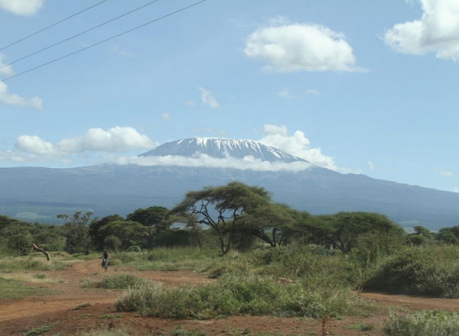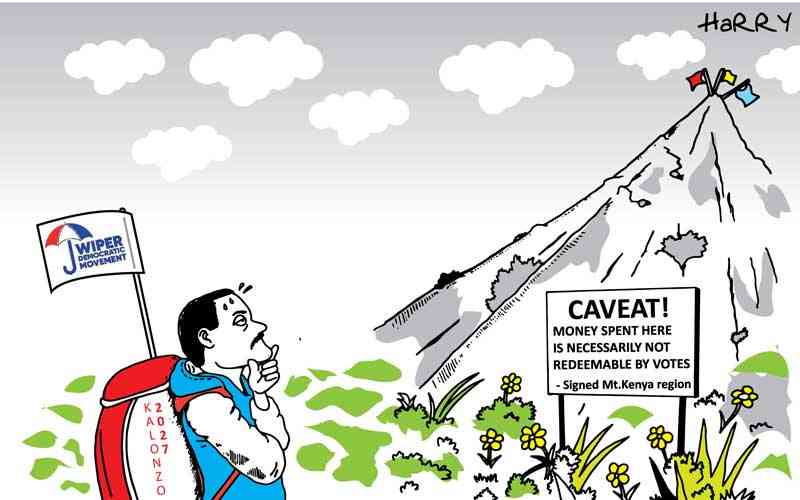
If all had gone well for Josephine Sanchoine, she would be the proud owner of her father’s 270 acres right now. The land would have been a source of livelihood for her and her six children.
But that is not the case. The title deed, she came to learn in 2012, is a different person’s name — a man she says does not even come from her community. She still doesn’t understand how he ended up owning the land.
Josephine is from Kajiado. She lives on the disputed land, passed down to her by her deceased father at Elang’ata Wuas Group Ranch in Kajiado West.
Josephine is a single mother struggling o keep that which she believes belongs to her. And now, in the recent years, she has had to face up to power, wielded by men.
It is hence easy to understand why she chokes back tears when asked to explain her plight. According to Maasai culture, Josephine is a “man”.
“My father gave birth to girls only. I was the last born. Before he died, he chose me to be the man of the family. He pronounced that all his wealth would be owned by me, his ‘son’,” she says.
Her sisters would be allowed to get married, but would stay at his father’s home. She is allowed to have children by men. However, the children belong to her father’s homestead and not the men by whom she got pregnant.
But the same culture that favoured her would be used by her male cousin to rob her of hundreds of cattle left to her by her father.
“I can’t read and I don’t understand so much about the law. The only thing I know is that I am being robbed in broad daylight. This man has even brought lawyers to my home to coerce me to sign some papers, but I refused,” she says, sobbing.
Josephine’s parcel of land is part of the larger Elang’ata Wuas Group Ranch.
“He has threatened me several times because I have refused to vacate the land. He has built right next to me. I fear for my life but I won’t leave. If he wants to kill me, he will do so while I occupy my father’s land,” she vows.
The ranch’s mangers have promised Josephine a fair outcome in the case but she believes it is part of a ploy to kick her out quietly.
shouting from the peak
Kenya’s Constitution, promulgated in August 2010, gives women as much right as men to own land and property. But women across the country, like Josephine, still suffer disenfranchisement on land ownership.
Stay informed. Subscribe to our newsletter
It is on this backdrop that Kenyan women from all walks of life — young and old, rich and poor — converged at the foot of Mt Kilimanjaro in October to match forth and reach the peak.
“I came to shout from the highest point in Africa. I wanted to tell my story and ask why I can’t be accorded similar rights as my brothers,” said Joyce Dama, one of the two Kenyan women who reached the peak of the mountain.
At 29, Dama’s slim frame cuts the figure of a weary woman. After successfully defending her mother’s right to inherit the land her father left behind at death, there is a lot to contemplate.
She had just turned 21 when she lost her father. It was also the year her uncles, supported by proxies of patriarchal culture, attempted to strip her and her siblings the land that belonged to her deceased father in Mikoroshoni, Shanzu, Mombasa County.
Dama, the only one among her siblings willing to put up a fight, went head to head with her father’s brothers.
Aware that the law was on her side, she lobbied local administration and put her mother’s name on the title deed. “We welcomed mum home afterwards where she rightfully belongs,” she said ecstatically.
Her parents had separated when she was young but were still legally married. Climbing Mt Kilimanjaro, she said, was a Herculean task: “Just as it feels for every woman in Kenya who yearns for recognition as the rightful owner of land when her husband dies.”
The fight by women to own land is not limited to Kajiado and Shanzu. Sarah Makau and Rhoda Wekesa are from Kitui and Kisumu, respectively.
Rhoda, born in Webuye, got married in Kakola, Ahero, in Kisumu. Sarah, on the other hand, was born in Maanza in Machakos, but got married in Kitise Village in Mwingi, Kitui County.
Both women are fighting to be rightful owners of the land left behind by their husbands following death.
in-laws
Sarah is locked in a battle pitting her against her in-laws who say she has no right to their brother’s land.
“My in-laws argue that I am not an original member of the family - that I have no rights to my husband’s property. This is in contravention of the law and I intend to fight on until the court determines where the truth lies,” she said. Both women were part of Kenyan representatives who made their voices heard at Mt Kilimanjaro.
Climbing Mt Kilimanjaro was meant to be a clarion call by humanitarian group ActionAid Kenya (AAK) for the rights of women to be actualised.
According to Philip Kilonzo, a technical advisor on natural resources and livelihoods with AAK, while land policies and laws guaranteed a woman’s right to ownership, “there is no implementation strategy in place”.
“The laws give sufficient basis to grant women ownership rights. There are, however, some grey areas. For instance, in community land laws, it is not clear how women’s co-ownership translates into the practical life,” said Kilonzo.
church intervened
Women from about 22 sub-Saharan African countries attended the three-day event, which culminated in a charter detailing what needs to be done. The charter was presented to an Africa Union representative.
“Culture demanded that I get inherited to continue living on my husband’s land. I refused and my in-laws sold what belonged to my husband,” said Rhoda. “It is my church’s intervention that has put me back in the land after my house was flattened. I still get death threats.”
Rhoda’s story was picked by the Kenya Land Alliance who are currently helping her get a title deed and safeguard the future of her three children.
“We have travelled this far to climb the mountain because something is hurting us the Kenyan women - ownership of land,” said Dama, to whom conquering Mt Kilimanjaro offered no touristic pleasures, but rather served as a reminder that the clamour for women’s land rights has just begun.
Dama noted: “The law is on our side but culture isn’t. I pray for a day a woman will own land and she won’t be fought on the basis of her gender.”
 The Standard Group Plc is a
multi-media organization with investments in media platforms spanning newspaper
print operations, television, radio broadcasting, digital and online services. The
Standard Group is recognized as a leading multi-media house in Kenya with a key
influence in matters of national and international interest.
The Standard Group Plc is a
multi-media organization with investments in media platforms spanning newspaper
print operations, television, radio broadcasting, digital and online services. The
Standard Group is recognized as a leading multi-media house in Kenya with a key
influence in matters of national and international interest.
 The Standard Group Plc is a
multi-media organization with investments in media platforms spanning newspaper
print operations, television, radio broadcasting, digital and online services. The
Standard Group is recognized as a leading multi-media house in Kenya with a key
influence in matters of national and international interest.
The Standard Group Plc is a
multi-media organization with investments in media platforms spanning newspaper
print operations, television, radio broadcasting, digital and online services. The
Standard Group is recognized as a leading multi-media house in Kenya with a key
influence in matters of national and international interest.








